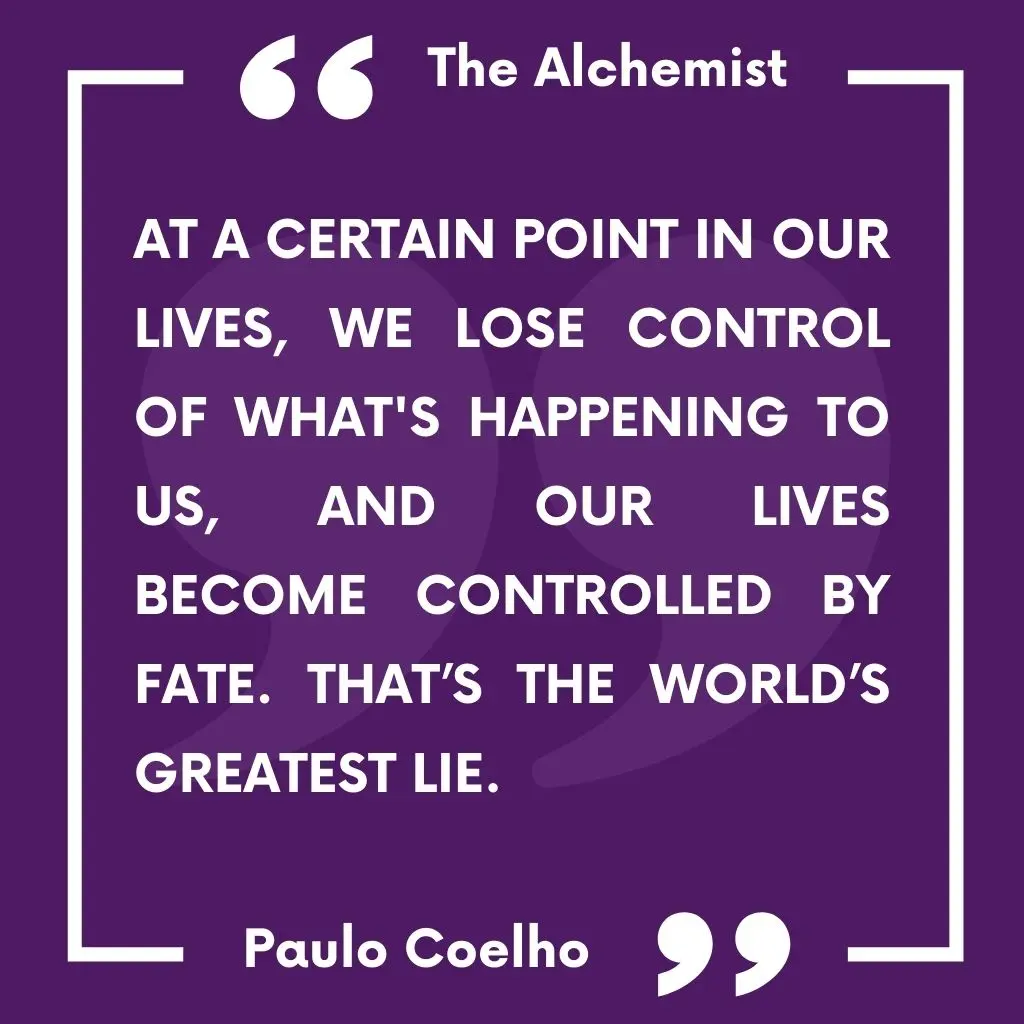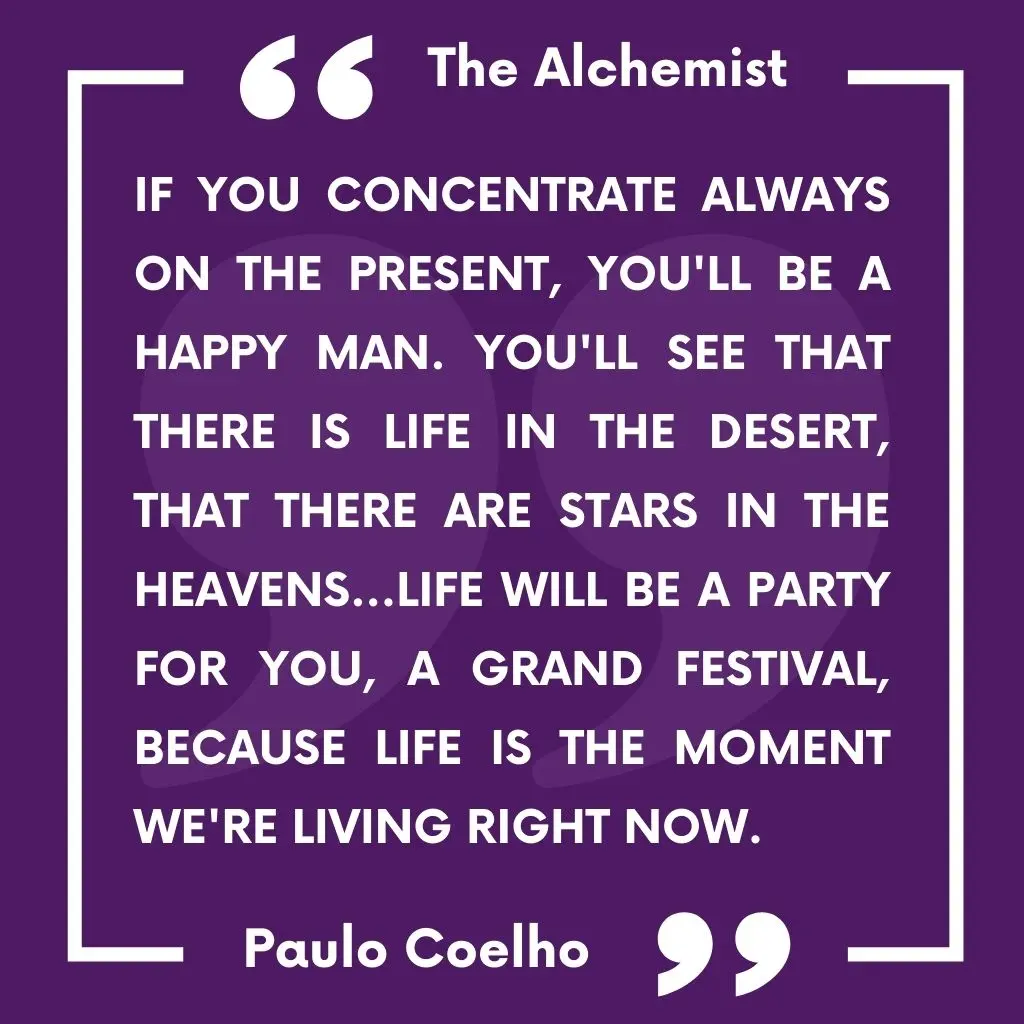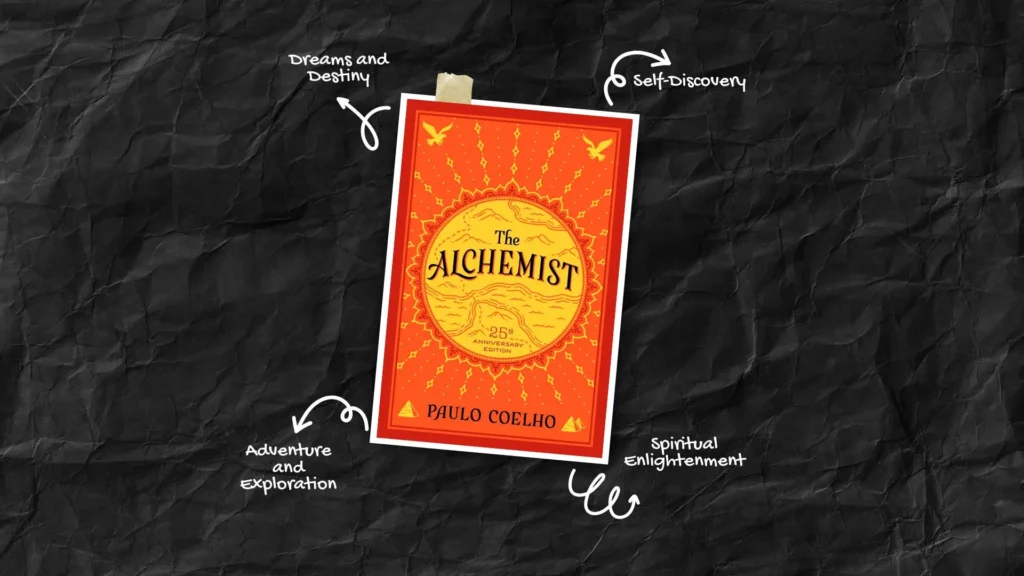Regarded as a modern classic, Paulo Coelho’s The Alchemist has inspired millions with its blend of magic, mysticism, and simple wisdom. More than just an adventure story, The Alchemist is a book about following your dreams, listening to your heart, and finding the extraordinary in the ordinary. What is the book The Alchemist about, and why do its lessons resonate so deeply with readers around the world?
In this The Alchemist book summary, we journey with Santiago, a humble shepherd from Spain, as he crosses deserts and continents in search of a hidden treasure. Santiago’s quest is more than a physical journey; it’s a metaphor for self-discovery and the pursuit of one’s destiny, making Coelho’s tale a timeless tale of inspiration and wisdom.
Chapter 1: Dreams Awaken Destiny
Santiago is a young shepherd from Andalusian, Spain, spends the night in an abandoned church with his flock. The church’s roof has fallen in, and a sycamore tree grows where the sacristy once stood. Santiago has a recurring dream while sleeping under the sycamore tree. Although the dream’s details aren’t immediately revealed, it clearly disturbs and intrigues him.
In the morning, Santiago heads to a village to sell some sheep’s wool to a merchant. As he travels with his sheep, he fondly remembers meeting the merchant’s daughter a year ago. He daydreams about her, hoping she will remember him. Upon arriving, the merchant asks Santiago to wait until afternoon.
Santiago passes the time reading to his flock and reflecting on why he chose the shepherd’s life. He recalls a personal history: as a boy, he had attended a seminary (his parents hoped he would become a priest), but he loves to travel. He told his father about his desire to see the world. His father, though initially practical, recognized Santiago’s passion and gave him three gold coins to buy a flock – explaining that only shepherds (of their humble background) truly travel. Santiago thus became a shepherd to fulfill his desire to travel.

After selling wool to the merchant and briefly conversing with the merchant’s daughter (who is charmed by his knowledge and travels), Santiago departs, promising to return next year.
That night, back at the abandoned church, Santiago has the disturbing dream again. The next morning, as he moves on with his sheep, he ponders the dream’s meaning. He realizes it might be a sign. Remembering that a Gypsy woman in the nearby town of Tarifa interprets dreams, Santiago decides to seek her out. The chapter closes with Santiago feeling both curious and apprehensive as he resolves to discover what his recurring dream – of a child leading him to a treasure at the Egyptian pyramids.
Chapter 2: Embracing the Call
In Tarifa, Santiago visits the old Gypsy woman to learn the meaning of his recurring dream. She leads him to a back room draped with bead curtains and has him swear to God that he will pay her if she interprets the dream. Santiago, cautious due to stories about Gypsies, is nonetheless intrigued. The Gypsy woman prays silently, then tells him in plain terms: in his dream, a child led Santiago to the Egyptian pyramids and said that there he would find a hidden treasure. She admits she cannot interpret it in any way other than literally – she believes Santiago must go to the pyramids to find this treasure. For her service, she surprisingly doesn’t charge money; instead, she asks that Santiago promise her one-tenth of the treasure he finds (an arrangement that makes Santiago uneasy). Skeptical and slightly disappointed by such a straightforward interpretation, Santiago leaves, thinking the dream’s meaning might be a trick or too impractical to take seriously.
Santiago then sits in the plaza of Tarifa to read. There, he encounters an old man who strikes up a conversation. This mysterious old man introduces himself as Melchizedek, and claims to be the King of Salem. He knows details about Santiago’s life that he couldn’t possibly know (such as Santiago’s parents’ names and the seminary). The old man tells Santiago that he appears to those people who are about to give up on their Personal Legend – a term Santiago hasn’t heard before. Melchizedek explains that a Personal Legend is one’s destiny in life, “what you have always wanted to accomplish.” He reveals that Santiago is at a crucial crossroads: he’s on the verge of either pursuing his dream (the treasure in Egypt) or settling back to the safe life of a shepherd. The old man gives Santiago advice wrapped in stories. First, he speaks of the world’s greatest lie: the notion that fate controls our lives more than ourselves. He insists this is false, and that everyone can choose to follow their dream. He also tells a story of a baker in the plaza who once dreamed of travel but settled for buying a bakery because it was safer – intending to travel “someday” in the future. “He never realized that people are capable, at any time in their lives, of doing what they dream of,” Melchizedek says of the baker, pointing out how the baker postponed his dreams until it was too late. This story hits home for Santiago, who doesn’t want to end up with regrets.

Melchizedek then offers to help Santiago if the boy gives him one-tenth of his flock of sheep in payment (coincidentally mirroring the Gypsy’s fee of one-tenth the treasure). In return, he promises to tell Santiago how to find the treasure. Santiago is astonished by the old man’s knowledge and his authoritative air. As they talk, Melchizedek imparts another crucial piece of wisdom: “When you really want something, it’s because that desire originated in the soul of the universe. It’s your mission on earth.” He further assures Santiago that if he pursues his Personal Legend, the whole universe will conspire to help him succeed. By the end of the chapter, after much soul-searching, Santiago is convinced that Melchizedek is no ordinary man. He decides to take the leap of faith. Santiago gives the old man the agreed ten percent of his flock (six sheep), thereby committing to the quest. In return, Melchizedek tells Santiago to seek out the Egyptian pyramids and offers concrete help: he gives Santiago two magical stones from his breastplate, called Urim and Thummim, which can be used for guidance (white for “yes,” black for “no”) if Santiago has trouble reading the omens. The next day, Santiago sells the remainder of his flock, leaving the stable life he knew entirely behind. With some money and the stones in hand, he boards a ship from Spain to cross the narrow sea to Tangier, Africa, beginning his journey toward the pyramids of Egypt.
Chapter 3: Rising from Setbacks
Santiago embarks on his journey by crossing from Spain to Tangier, a port city in Morocco, North Africa. Arriving in Tangier, he is immediately struck by culture shock: the language (Arabic) is unfamiliar, local people dress differently, and he witnesses the daily call to prayer from minarets, something he’s never seen. Feeling like a stranger, Santiago carries his pouch of money (from selling his sheep) tightly and looks for a way to get to the pyramids. He meets a young local man in a bar who speaks some Spanish. Santiago naively trusts this stranger and confides that he needs to travel to Egypt. The young man offers to help as a guide. Relieved at finding someone friendly, Santiago follows him through the chaotic marketplace. In a moment of distraction, the young man disappears with all of Santiago’s money, effectively robbing him. By sundown, Santiago realizes he’s alone in a foreign land with no money, no friends, and no way home. He feels betrayed and frightened; he even contemplates giving up on his dream, thinking he was foolish to leave Spain.

However, as Santiago sleeps in the marketplace, he remembers Melchizedek’s advice and finds Urim and Thummim, the two stones, still in his pocket. In fact, they drop to the ground, catching his attention. Recalling that the old king said the stones would help interpret omens, Santiago takes this as a sign that he should not despair. Encouraged, he reframes his situation: he tells himself he’s an adventurer looking for treasure rather than a victim of theft. The next morning, Santiago wanders up a steep hill in Tangier and comes upon a crystal shop. He observes the crystal merchant’s shop is dirty and has had no customers all morning. Remembering that he must take initiative to survive, Santiago offers to clean the merchant’s glassware in exchange for a meal. The crystal merchant agrees, and Santiago vigorously cleans all the crystal glasses in the storefront. Soon after, two customers come and purchase crystal, impressed by the newly shined display. Seeing Santiago’s work brings in business, the crystal merchant offers Santiago a job in his shop.
Over the next eleven months, Santiago works for the crystal merchant. Santiago learns the trade of selling crystal and gradually improves the shop. Early on, he suggests building a display case on the hill to attract more customers (since many travelers climb that hill and might buy souvenirs). The merchant is hesitant but eventually agrees. The display case idea is a success, drawing more buyers. Encouraged, Santiago also proposes selling tea in crystal glasses to take advantage of thirsty travelers – this would not only sell tea but also increase the sale of glasses. The merchant initially resists (fearing it’s not customary), but he too warms to Santiago’s innovative idea. Offering mint tea in fine crystal becomes another hit, turning the shop into a popular spot and greatly increasing the merchant’s profits. Santiago’s hard work and creativity create a boom; in less than a year, the once-struggling crystal shop is thriving. Santiago himself earns a good commission and learns to speak some Arabic.
As Santiago and the merchant bond, they share personal stories. The crystal merchant reveals he is a devout Muslim whose lifelong dream was to make a pilgrimage to Mecca, the holy city. Santiago encourages him to go now that business is better, but the merchant confesses that he cannot fulfill that dream. He admits, “It’s the thought of Mecca that keeps me alive… I’m afraid that if my dream is realized, I’ll have no reason to go on living”. He says he prefers to dream about Mecca rather than actually go, for fear reality will disappoint him. This deeply affects Santiago. After eleven months, Santiago has earned enough money to return to Spain and buy twice the number of sheep he originally had. Initially, he plans to do just that – to consider his adventure a well-learned lesson. However, as he prepares to leave, Santiago feels unrest. The crystal merchant, in a bittersweet moment, tells Santiago that he knows the boy will not actually return to being a shepherd, just as the merchant himself will not go to Mecca. The merchant gives Santiago his blessing but also a warning implied in his own story: not everyone has the courage to pursue their dreams to the end.
By the end of the chapter, Santiago stands at a crossroads again. With money in hand, he could easily go home a “successful” man. But influenced by the merchant’s example and his own heart, Santiago decides instead to continue pursuing his Personal Legend. He realizes that the year at the crystal shop, while unexpected, was an important part of his journey. With renewed resolve, Santiago joins a caravan crossing the Sahara Desert towards Egypt, thus recommitting to the quest for the pyramids and the treasure. The chapter closes with Santiago embarking with the caravan, heading into the vast desert—once again stepping into uncertainty, but this time with money, experience, and hard-earned wisdom by his side.
Chapter 4: Lessons of the Desert
Santiago becomes part of a caravan crossing the Sahara Desert towards Egypt. The caravan is large, consisting of dozens of travelers, their camels, and goods. As the journey begins, Santiago meets an Englishman who carries a load of books and sophisticated gear. The Englishman is traveling to the Al-Fayoum oasis in search of a famous alchemist who is said to be over 200 years old and capable of turning any metal into gold. Curious about this, Santiago befriends the Englishman. During long days of travel, they share their stories. Santiago talks about his own quest for treasure at the pyramids, and the Englishman explains that he has been studying alchemy at university libraries for years. The Englishman carries two special items: the texts speak of the Philosopher’s Stone (a small stone that can turn metal to gold) and the Elixir of Life (a liquid that can cure all illness and grant longevity). He is obsessed with finding the secrets to these, which is why he seeks the master alchemist at the oasis.
As the caravan presses deeper into the desert, everyone maintains a strict routine. The camel drivers and Bedouins leading the caravan insist on silence during much of the journey – the travelers communicate in gestures and brief exchanges, conserving energy and alertness. Santiago initially finds the silence unsettling, but he begins to appreciate the desert’s vastness and the clarity it brings to his mind. He starts learning from the camel driver assigned to him. The camel driver, an experienced man, shares simple but profound wisdom with Santiago. He says he lives in the present and doesn’t fear the future because life is only the moment we’re living. One night, under the starry desert sky, the camel driver tells Santiago: “If you can concentrate always on the present, you’ll be a happy man… You’ll see that there is life in the desert… Life will be a party for you, a grand festival, because life is the moment we’re living right now.”. Santiago takes this to heart, finding contentment in each day of travel rather than anxiously yearning for the destination.

Meanwhile, the Englishman is often absorbed in reading his thick books on alchemy. He struggles with the desert’s silence and sometimes complains that Santiago isn’t devouring the books as he hoped. Instead, Santiago feels he learns more by observing the caravan and nature – a realization that puzzles the Englishman. The Englishman does share some key concepts of alchemy with Santiago: notably, the idea of the Soul of the World – that all things are connected and have a soul, and one’s actions (when pursuing one’s Personal Legend) can tap into that universal soul. The Englishman explains that alchemy is a process of purifying metals (and oneself) to achieve perfection (gold for metal, enlightenment for the alchemist). Santiago listens, though he understands better through simple things like watching the desert sunsets and listening to the camel driver’s life lessons.
As the caravan progresses, war is looming in the desert. Tribes are in conflict, and news of fighting reaches the caravan via desert messengers. This adds tension; the caravan leader starts traveling both day and night to reach the oasis quickly, and he enforces strict rules to avoid detection. Despite the danger, Santiago finds he no longer feels fear as he did when he was first robbed. He has developed trust – in the caravan leader’s wisdom, in the omens along the way, and in his own journey’s purpose. At one point, the Englishman uses Urim and Thummim to decide if they are on the right path; this surprises Santiago, who realizes the old king must have also visited the Englishman. It reassures Santiago that omens and personal quests tie people together.
Eventually, after many exhausting weeks, the caravan arrives safely at the Oasis of Al-Fayoum, which is neutral ground and refuge amidst the tribal wars. The oasis is enormous, filled with date palms, springs, and hundreds of tents – essentially a temporary desert village. As they enter the oasis, Santiago is awed by the greenery after so long in the barren desert. The caravan leader reminds everyone that, according to the oasis law, no one may carry weapons inside (as oases are places of peace). They plan to stay until the war ends. The Englishman immediately sets off to find the alchemist who lives there, and Santiago joins him, intrigued to possibly meet the man who might hold keys to his own understanding of the Soul of the World.
Chapter 5: Love and Destiny
At the oasis of Al-Fayoum, Santiago finds a vibrant community of tents, palm trees, and wells – a welcome paradise after the harsh desert. The caravan travelers are to stay here until the war between the desert tribes ends. The Englishman wastes no time and asks various oasis residents about the 200-year-old alchemist. He is repeatedly pointed toward the south end of the oasis, but nobody gives him a direct answer on how to meet the alchemist – the man is elusive and not directly approachable.
Santiago, meanwhile, helps the Englishman in the search. One morning, by the oasis well, Santiago encounters a young woman who has come to fill her water jug. She is breathtakingly beautiful, with dark hair and eyes that (he thinks) reflect the wisdom of the desert. Her name is Fatima. The moment Santiago sees her, he feels a powerful surge of love – as if he knew instantly that she is the one he’s been waiting for. He speaks with her, introducing himself as a traveler. In their short exchange, both are shy but clearly drawn to one another. After Fatima leaves, Santiago realizes he has experienced what the alchemists refer to as the “Soul of the World”: a love that emanates from the pure language of the heart. He feels his heart “speak” loudly for the first time. Over the next few days, Santiago returns to the well at the same time, hoping to see Fatima. They meet again and again, and their affection grows rapidly. Santiago eventually tells Fatima that he loves her and wants her to be part of his journey. Fatima gently blushes and confesses that she has been waiting for him all her life as well. Despite having just met, both accept this as true love – a destiny (Maktub) written in the desert.
While Santiago is blissful in love, the Englishman finally devises a plan to find the alchemist: he begins building a furnace outside his tent to attempt the Master Work (alchemy’s ultimate process) himself, hoping to attract the alchemist’s attention. His noisy and smoky experiments do eventually draw notice. One day, a hooded horseman gallops into the oasis, causing a stir. This intimidating figure, dressed in black and mounted on a splendid white horse with a falcon on his shoulder, confronts Santiago and the Englishman. He peppers Santiago with sudden, hard questions (testing their courage and purpose). Santiago, though startled, responds honestly that he is searching for his treasure and also that he has found love at the oasis. The horseman then reveals himself to be the Alchemist of the oasis. However, instead of engaging the Englishman (who sought him), the alchemist is more interested in Santiago – noting that Santiago’s eyes show brightness and a Personal Legend in progress. The alchemist gives only a cryptic instruction: he invites Santiago to come meet him the next night outside the oasis, if Santiago truly understands why the desert brought him here. Then the alchemist rides off abruptly.
This encounter leaves the Englishman a bit disappointed (he had hoped to directly learn from the alchemist), but he interprets it as a sign that he should continue his experiments on his own. Santiago, on the other hand, is intrigued and a bit nervous. He is falling deeply in love with Fatima and contemplates staying at the oasis with her, maybe giving up the treasure quest. Fatima senses this conflict in Santiago. She tells him that as a woman of the desert, she understands that men must leave to pursue their dreams – and that if they are truly meant to be, he will return. She encourages Santiago not to sacrifice his Personal Legend for her, insisting, “If I am really a part of your dream, you’ll come back one day.”. Though it’s painful, Fatima’s words strengthen Santiago’s resolve to continue his journey. She demonstrates unconditional love by letting him go, trusting in destiny (Maktub) to reunite them.
That night, Santiago wanders the oasis pondering the alchemist’s test and Fatima’s devotion. He realizes that the desert’s omens have not stopped – in fact, one day while gazing at the horizon, Santiago witnesses an omen: he sees two hawks fighting in the sky, and suddenly a vision flashes in his mind of an army riding through the oasis, attacking it. Interpreting this as a warning from the Soul of the World, Santiago feels he must act to protect the oasis. Breaking a taboo (outsiders shouldn’t involve in oasis matters), Santiago approaches the oasis chieftains to tell them about the vision of an attack. He explains that, according to the desert’s language, the oasis (which is neutral and unarmed) is in danger imminently. After deliberation and recalling ancient traditions valuing seers, the tribal chieftain decides to take Santiago seriously. He orders everyone in the oasis to arm themselves and to be on alert. He also makes a stern decree: if no enemy appears by the next day’s sunset, Santiago will be executed for false prophecy; but if an attack comes, Santiago will be rewarded with gold. This heavy responsibility weighs on Santiago, but he remains convinced the omen was real.
The next day at sunset, indeed, a band of renegade warriors breaks the code of war and invades the oasis, attempting a surprise raid. Thanks to Santiago’s warning, the oasis defenders are ready and defeat the invaders easily. Santiago’s omen has saved many lives. True to his word, the chief gives Santiago 50 pieces of gold and asks him to become the oasis’s counselor. Santiago is celebrated, but he remains humble, realizing this success is part of following the omens, not his final goal. That night, the alchemist visits Santiago (now that the boy has proven his ability to read the desert’s signs and shown courage). The alchemist tells Santiago he will guide him toward the pyramids. Santiago is initially hesitant – leaving Fatima and a life of apparent abundance is hard – but he recalls Fatima’s faith and his own Legend. Resolving to finish what he started; Santiago accepts the alchemist’s offer. With a mixture of sadness (parting from Fatima for now) and determination, Santiago prepares to journey on with the alchemist, venturing beyond the oasis into the desert once more.
Chapter 6: Mastering the Language of the World
Santiago leaves the oasis with the alchemist, riding across the desert on horseback. They travel by night guided by the moon and stars, and rest during the day. The journey is both physical and spiritual; as they venture further into the war-torn desert, the alchemist begins to impart his wisdom to Santiago. He instructs Santiago to listen to his heart as they travel, for the heart is closest to the Soul of the World. Initially, Santiago’s heart is anxious – it misses Fatima, it fears the dangers ahead (especially with the war around them), and it doubts whether it will find the treasure. Santiago confesses these fears to the alchemist. In response, the alchemist shares profound insights: he tells Santiago not to be afraid of suffering because “every second of the search is an encounter with God and eternity”. He advises Santiago to keep listening even if his heart is agitated, because hearts tend to be fearful, but by heeding it, Santiago will eventually understand what it wants to communicate.
As days pass, Santiago grows more attuned to the desert and his own heart. He and the alchemist occasionally meet tribesmen or see evidence of war (distant smoke, tracks), but the alchemist remains calm, often saying the outcome is written by Allah. Santiago’s heart gradually becomes more confident and peaceful. At one point, the alchemist tests Santiago by asking him to find life in the desert. Santiago is confused at first, but recalling his connection with nature, he lets his horse wander freely. The horse eventually finds a patch of ground where a small cobra (a symbol of life and danger) lurks. The alchemist is pleased; Santiago could sense life where others saw only emptiness, meaning he is learning the Language of the World deeply. The alchemist takes this opportunity to demonstrate his own prowess: he digs up the cobra (showing no fear), and it coiles around his arm harmlessly. This display reinforces the alchemist’s complete harmony with nature and impresses Santiago.
During one of their nighttime talks, the alchemist explains the process of Master Work: how alchemists purify metals, and in doing so purify themselves. He speaks of the Emerald Tablet (a legendary piece of alchemical wisdom etched on emerald) and the simplicity of true wisdom. Santiago admits he still doesn’t fully understand alchemy in terms of turning lead to gold, but the alchemist assures him that he is performing the ultimate alchemy by pursuing his Personal Legend.
The journey continues for about a week, and Santiago’s trust in the alchemist grows. One afternoon, the alchemist and Santiago are captured by a tribe of Arab soldiers (as the region is fraught with tribal wars). The tribesmen take them to a military camp. The alchemist, to save their lives, tells the chieftain that Santiago is a powerful alchemist who can turn himself into the wind in three days’ time. Santiago is stunned by this claim – he has no idea how to do that. The chieftain, intrigued (and somewhat skeptical), decides to spare them for three days, but if by the third day Santiago cannot indeed become the wind, they will both be executed. After the soldiers leave the prisoners alone, Santiago panics and asks the alchemist why he said such a thing. The alchemist responds calmly that this challenge is necessary – that Santiago’s journey would be incomplete without mastering the wisdom of the world to that degree. Essentially, the alchemist has created a do-or-die situation as the final test of Santiago’s spiritual growth.
In the next three days, with the alchemist mostly looking on, Santiago contemplates how on earth he might turn into the wind. On the first day, he wanders the camp’s boundary, observing the desert and sky, trying to recall all he has learned. The second day, Santiago speaks to the desert itself. He asks the desert for help, saying he needs its sand storms to aid him in becoming wind. The desert says it can’t turn him into wind but suggests asking the wind. Santiago then converses with the wind (the simoom). The wind is curious; it hasn’t heard a mortal speak to it in a long time. Santiago asks the wind to create a storm powerful enough to carry him to the sun, because perhaps the sun can transform him. The wind is eager to show off its might and agrees, whipping into a massive sandstorm (to the awe and fear of the watching tribesmen). As the wind roars, Santiago then speaks to the sun. He praises the sun’s wisdom, speaking of love (using his experiences with Fatima) and how love is the force that can transform the Soul of the World. The sun, impressed by Santiago’s understanding of love, admits it cannot directly turn him into wind either, and suggests he speak to the hand that wrote all – essentially, to God or the Soul of the World itself.
In the climax of this spiritual exercise, Santiago goes deep into contemplation. He realizes that his soul is one with the Soul of the World and thus one with God. In an epiphanic moment of unity, Santiago prays and immerses himself in that oneness. Suddenly, Santiago disappears from where he stood, and reappears on the other side of the camp, traveling with the wind itself. To the astonished soldiers, it indeed seems the boy has become the wind – they cannot see him clearly amid the sandstorm, only feel the tremendous power he’s channeled. After the storm subsides, Santiago reappears where he originally stood, and the camp is absolutely silent and reverent. The tribal chieftain, acknowledging a divine act, frees Santiago and the alchemist. He also provides them with an escort to continue safely. The alchemist and Santiago leave the camp, Santiago now transformed by his own miraculous feat. Santiago has fulfilled what seemed an impossible challenge by communicating with nature and the heavens; effectively, he has achieved a form of Master Work – not turning lead to gold, but uniting with the fundamental forces of the world.
The two journeys on. Eventually, they reach a Coptic monastery near the pyramids. There, the alchemist demonstrates actual alchemy: he uses the Philosopher’s Stone to turn lead into a lump of gold. He divides the gold into four parts – giving one part to the monk for generosity, one to Santiago (in case he needs it), keeping one, and leaving one with the monk for Santiago in case he might need it later. The alchemist then says his farewells. He has guided Santiago as far as needed. The pyramids are a couple of days’ journeys away; Santiago must go alone to complete his Personal Legend. The alchemist reiterates some final wisdom, congratulating Santiago on listening to his heart and learning the Language of the World. They part ways, with Santiago feeling both gratitude and a bit of sadness as he leaves his mentor.

Finally, Santiago arrives at the Egyptian pyramids under the stars. Overcome with emotion, he falls to his knees and weeps, thanking God for guiding him this far. Santiago begins to search for the treasure at the foot of the pyramids. Recalling his dream, he chooses a spot where he sees a scarab beetle in the sand – in the desert, the scarab is a symbol of God, so he takes it as a sign. He starts digging feverishly with his hands and a makeshift shovel, hoping to unearth the treasure promised by his dream.
He begins to dig at the spot where his tears land, believing it’s an omen where the treasure is buried. He digs for hours into the night, but finds nothing. Just as he is losing hope, two refugees from the tribal wars come upon him. They think Santiago might have wealth. The men find the piece of gold that Santiago carries (the one the alchemist gave him) and snatch it away. So, they rob him of the gold piece. This is not enough to satisfy them, so they force Santiago to continue digging, thinking more treasure might be buried there. Santiago keeps digging but there is still nothing. The thieves became frustrated and beat him brutally. As they depart, Santiago, battered, tells them he’s digging for a treasure because of a dream – the reason he came all this way. He explains that he was told in a dream to seek treasure at the Egyptian pyramids.
The men find this story ridiculous and assume Santiago is crazy. One of the refugees laughs and says he also once had a recurring dream of a treasure – in an abandoned church in Spain under a sycamore tree. He tells Santiago once he was foolish enough to almost go look for it, but later he decided not to chase some silly dream. The robber mockingly tells Santiago not to be as stupid as he was, then he and his companion depart, leaving Santiago nearly unconscious but alive. They have the single gold piece, but they leave behind Santiago’s shovel and don’t bother with him further.
Santiago realizes with a thunderstruck laugh that the treasure might be exactly where his journey began: at the ruined church in Andalusia, Spain. The journey was necessary to make this discovery, but the actual gold is at his home. Santiago understands this final omen – the words of the robber – as the last piece of guidance from the universe.
Epilogue
Santiago returns to Spain, retracing his long journey in reverse. He makes his way back to his hometown in Andalusia and finally to the abandoned church where he once slept on a winter night with his sheep. The sycamore tree still grows up through the broken roof, just as before.
Remembering the robber’s words and his own dream, Santiago digs at the base of the sycamore. After some time, his shovel strikes something solid. Exactly where the dream had indicated, he uncovers a chest of treasure: gold coins, precious gems, and ancient relics – far more wealth than he had ever imagined.
Santiago sits down amid the dusty sacristy, laughing and crying at the same time. He is overwhelmed with gratitude. He now has both the treasure of material wealth and, more importantly, the rich experiences and wisdom gained from his journey pursuing his Personal Legend.
As Santiago contemplates his long, adventure-filled path and the love waiting for him, a breeze fills the sacristy – the Levanter wind that first inspired him to travel. In the wind, he seems to hear Fatima’s voice coming from the desert, or perhaps it is just the memory of her promise. Santiago smiles and whispers, “I’m coming, Fatima,” knowing that his journey is complete and that he will soon return to the oasis to reunite with the woman he loves.
